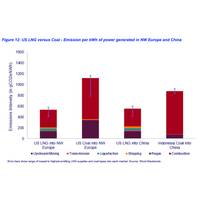Bright Future for LNG Bunkering - TMR
Transparency Market Research (TMR) have given a detailed insights and analysis of the global market for LNG bunkering fuel in its recently published market research report. On the basis of capacity, the market, which had a valuation of mere 70 kilo tons in 2013, is projected to expand at an astounding 63.6% CAGR between 2014 and 2025 and reach 22,540 kilo tons by 2025.
The report includes an analysis of market’s historical statistics to present an overview of the growth trajectory exhibited by the global LNG bunkering market over the past few years and forecasts the course the market is likely to adopt over the report’s forecast period.
Since marine vessels, the prime consumers of bunker fuel, spend a large part of their voyage time within emission control zones/areas (ECA), most shipping companies in the global market are making a gradual shift from traditional engines to LNG-fueled engines. The continuously rising marine trading activities and container traffic in Europe and Asia Pacific is boosting the overall adoption of LNG as a bunker fuel in these regions.
As the regulations regarding sulfur emissions continue to tighten, the between the prices of natural gas and conventional fuels is likely to widen. Also, LNG is a good bunkering alternative for shipping companies operating in emission control areas (ECAs). Lower cost of LNG as compared to other variants of bunkering fuels compliant with ECA norms in Europe and North America are the key factors driving an increased demand for LNG bunkering fuels in these regions. The low cost of LNG is also expected to propel the overall LNG bunkering fuel market over the report’s forecast period.
A majority of LNG bunkering stations across the globe are currently located in Northern Europe. These LNG stations are specifically designed to cater to the bunkering needs of inland marine vessels as well as large ships. Financial assistance provided by the European Union and several initiatives adopted by port authorities are further benefitting the LNG bunkering market across Europe.
The continuous decline in natural gas prices in North America is also expected to boost sales of LNG as a bunker fuel in prominent North American ports. A substantial rise in investments aimed at the development of LNG stations in Asia Pacific countries like China and South Korea is expected to drive the market for LNG bunker fuel in the region.
The report also presents a comprehensive overview of the competitive landscape of the global LNG bunker fuel market with the help of detailed business profiles, SWOT analysis, details regarding business and financial strategies, and recent developments of some of the key companies operating in the global LNG bunker fuel market. The companies profiled in the report include Gasnor AS, Korea Gas Corporation, GDF SUEZ S.A, Harvey Gulf International Marine LLC., and Skangass AS.











